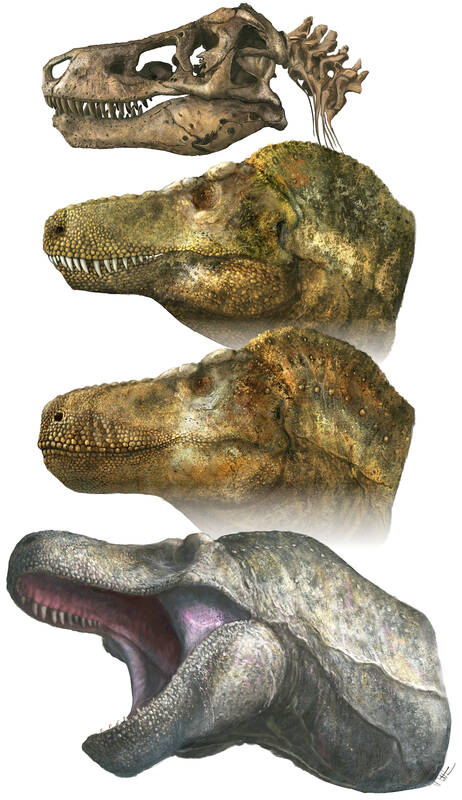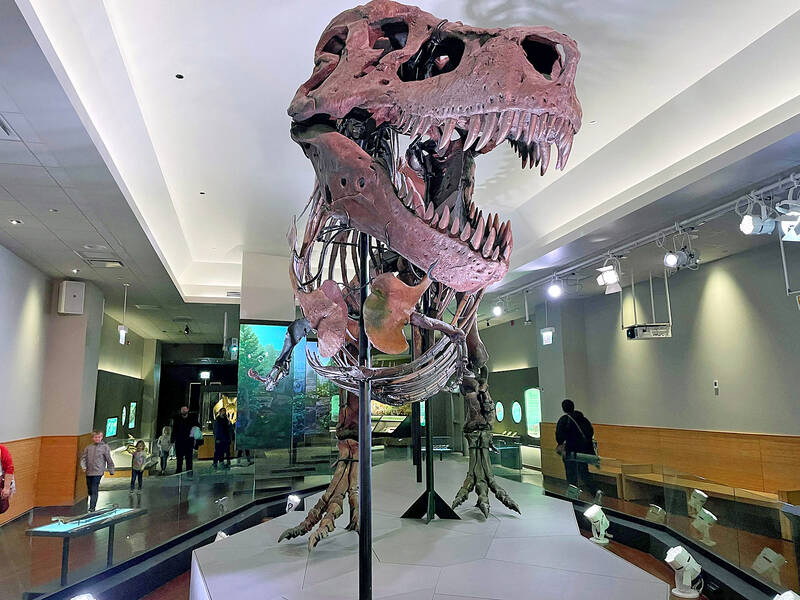They probably did not smile, frown or snarl, but T rex and its relatives almost certainly had the dinosaur equivalent of lips — a new finding by scientists that challenges popular depictions of these predators as having big nasty teeth sticking out of their mouths.
Researchers said on Thursday three lines of evidence — the skull and jaw anatomy in the group called theropods that encompassed all the meat-eating dinosaurs, the wear patterns of their teeth and the relationship between tooth size to skull size — all indicated the presence of lip-like structures.
“Our study suggests that theropod dinosaurs did not have exposed teeth when the mouth was closed,” said Auburn University paleontologist Thomas Cullen, lead author of the study published in the journal Science.

Photo: AP
“Dinosaur lips would be different from mammal lips in that they would cover the teeth but could not be moved independently — couldn’t be curled back into a snarl or make other sorts of movements we associate with lips in humans or other mammals. In this way, dinosaur lips would be more similar to those of many lizards or amphibians, even if we typically associate the structure and term with mammals like ourselves,” Cullen said.
These dino lips would have been a scaly counterpart to the kind with which people pucker up. They also would not technically be called lips, but rather “labial scales.”
Scientific and popular culture depictions of Tyrannosaurus and other meat-eating dinosaurs — think of the T. rex in the 1993 movie Jurassic Park — often have shown their teeth as exposed like those of crocodiles. In reality, the researchers said, the teeth likely were covered by soft facial tissues as with most land reptiles including Komodo dragons, the world’s largest lizard that inhabits certain Indonesian islands.

Photo: AFP
“Living monitor lizards like Komodo dragons are perfect living analogues — flesh-eating active predators with surprisingly similar teeth to that of dinosaurs,” said paleontologist and study co-author Robert Reisz of the University of Toronto Mississauga.
Dino lips offer several advantages.
“The full closure of their mouth with labial scale-covered lips protects the inside of the mouth — the oral cavity — against the dry terrestrial environment so that the usual oral environment — the oral glands, sensory organs and moist tongue — would be protected. This represents the normal biological condition for a terrestrial animal, while living crocs diverged from this pattern as they became predominantly aquatic or amphibious,” Reisz said.
Sealed lips would help saliva secretions in the mouth keep teeth, particularly the enamel, hydrated, Cullen said. If teeth are allowed to dry out, they become more prone to damage during feeding or fighting, Cullen added, not ideal if you are the fiercest fighter in the forest.
An examination of the relationship between tooth size and skull size undercut the idea that large theropods simply had teeth too big to be covered by lips. The study identified large lizard species with lips alive today that possess teeth proportionally bigger than T rex, relative to skull size.
In crocs, teeth show asymmetrical wear, with the side of the exposed teeth facing outward more beat up than the inner side. No such asymmetrical wear was detected when the scientists scrutinized exemplary tooth fossils of Daspletosaurus, a close cousin to T. rex, suggesting the presence of lips.
Finally, an examination of theropod skulls found evidence of small pits along the upper jaws that house nerves and blood vessels to supply lips and gums, structures lacking in crocs.
“We have a much more realistic interpretation of the facial features of theropods, important to understanding their biology,” Reisz said.
Cullen added, “What we are in many ways striving for here is for dinosaurs to be seen for what they actually were — animals — and not purely as movie monsters.”

Behind a car repair business on a nondescript Thai street are the cherished pets of a rising TikTok animal influencer: two lions and a 200-kilogram lion-tiger hybrid called “Big George.” Lion ownership is legal in Thailand, and Tharnuwarht Plengkemratch is an enthusiastic advocate, posting updates on his feline companions to nearly three million followers. “They’re playful and affectionate, just like dogs or cats,” he said from inside their cage complex at his home in the northern city of Chiang Mai. Thailand’s captive lion population has exploded in recent years, with nearly 500 registered in zoos, breeding farms, petting cafes and homes. Experts warn the

The unexpected collapse of the recall campaigns is being viewed through many lenses, most of them skewed and self-absorbed. The international media unsurprisingly focuses on what they perceive as the message that Taiwanese voters were sending in the failure of the mass recall, especially to China, the US and to friendly Western nations. This made some sense prior to early last month. One of the main arguments used by recall campaigners for recalling Chinese Nationalist Party (KMT) lawmakers was that they were too pro-China, and by extension not to be trusted with defending the nation. Also by extension, that argument could be

Aug. 4 to Aug. 10 When Coca-Cola finally pushed its way into Taiwan’s market in 1968, it allegedly vowed to wipe out its major domestic rival Hey Song within five years. But Hey Song, which began as a manual operation in a family cow shed in 1925, had proven its resilience, surviving numerous setbacks — including the loss of autonomy and nearly all its assets due to the Japanese colonial government’s wartime economic policy. By the 1960s, Hey Song had risen to the top of Taiwan’s beverage industry. This success was driven not only by president Chang Wen-chi’s

Last week, on the heels of the recall election that turned out so badly for Taiwan, came the news that US President Donald Trump had blocked the transit of President William Lai (賴清德) through the US on his way to Latin America. A few days later the international media reported that in June a scheduled visit by Minister of National Defense Wellington Koo (顧立雄) for high level meetings was canceled by the US after China’s President Xi Jinping (習近平) asked Trump to curb US engagement with Taiwan during a June phone call. The cancellation of Lai’s transit was a gaudy